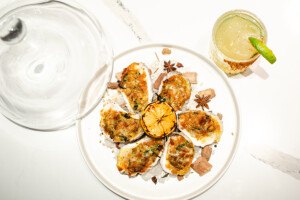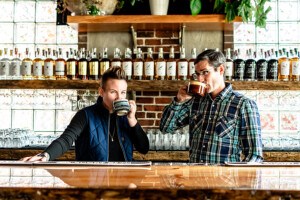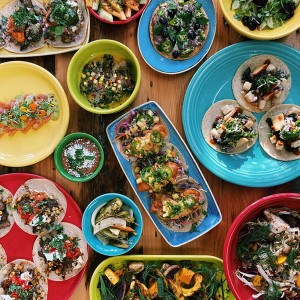The Perfect Partnership of Coffee and Ale

Night Shift Brewing’s Bean Porter/Photo courtesy of Night Shift Brewing
The letters K, B, and S have a special meaning for craft beer aficionados. Ask anyone that barters through forums on Ratebeer.com, cellars rare Russian imperial stouts, or knows anything about the hallowed Toronado Pub in San Francisco. The three-letter acronym emerges once every April and sends sane men into a myopic frenzy. Kentucky Breakfast Stout — or, KBS to its disciples — is a rare bourbon barrel-aged coffee stout from Founder’s Brewing out of Grand Rapids, Michigan, and easily one of the most sought after beers in the world.
The marriage of coffee and craft beer hasn’t always been embraced this way, though. When Red Hook introduced their Double Black Stout in 1995, even the experts scoffed. Starbucks coffee brewed alongside hops and roasted malt? Ludicrous! In an article for Bloomberg News Service David Edgar, the director of the Institute for Brewing Studies in Boulder, Colorado, likened it to the much-maligned “fruit beers” of the late ’90s (i.e. Pete’s Wicked Strawberry Blonde) and conceded that it “might have an appeal to a non-beer drinker.”
The public clearly didn’t agree, especially when groundbreaking Scotch and beer critic Michael Jackson began lauding the style’s potential. Soon other breweries were experimenting with caffeinated stouts and porters, like Berkshire Brewing Company’s Gary Bogoff who introduced his Dean’s Beans Coffeehouse Porter in 1996, brewed with a proprietary blend of fair trade coffee roasted in Orange, MA.
Thanks to the pioneering efforts from brew masters like Bogoff, coffee adjuncts are no longer seen as a marketing gimmick. Three of New England’s most respected breweries are now approaching coffee beans with the same gravity and fastidiousness as they do hops. All fans of the artisanal coffee movement, personified by brands like Chicago’s Intelligentsia and Oakland’s Blue Bottle, these progressive brewers are experimenting with everything from single-origin beans to home roasting. Now Hill Farmstead, Peak Organic, and Night Shift Brewing are making small-batch coffee beers that are some of their most coveted offerings, lending credence to a style once considered a “flash in the pan.”
Night Shift Brewing Bean Porter
This collaboration between Everett’s Night Shift Brewing and Bean Snowboards debuted last December and according to cofounder Michael Oxton, has been one of the brewery’s “best-received beers ever.” With no outside distribution and sales limited to draft pours and bottles from their tap room, Bean Porter initially sold out within two weeks.
Due to high demand, Night Shift has brewed a second 200-gallon batch (released on Feb. 19.), which will be its last of the year. Brewed with vanilla beans and whole bean Ethiopa Harrar coffee, Bean Porter is then aged in bourbon and rye barrels for seven weeks. The key, to Oxton, “is using the freshest possible roast.” Night Shift picks up beans from the J.P. Licks roastery within an hour of brewing to achieve a coffee pungency that can combat the natural richness of the porter.
If you miss out on Bean Porter, make sure to look out for the spring release of Oxton’s mystery coffee project that will utilize a saison yeast strain.
Peak Organic Espresso Amber Ale
When asked to choose between his passion for coffee and beer, Peak Organic founder Jon Cadoux tells me “it’s a Sophie’s choice.” Brewed since 2008, Cadoux annually changes his coffee sources to coax different flavor profiles. “What we’ve been doing since we first brewed this beer is keeping the beefed-up amber foundation and then adding different coffees,” says Cadoux. “One year we did a roast that was downright chocolatey, fudgy, and nutty. We’ve done others that are dark and piercing espresso blends. This vintage is really cool, it has this unbelievable green apple and cinnamon character.”
Without the the competing note of smoke usually derived from roasted malts, the slightly fruity coffee aroma becomes even more prevalent. Made with fair trade Honduran coffee roasted by Irving Farm in New York’s Hudson Valley, this year’s Espresso Amber ale drinks like boozy cold brew coffee, with the complexity and nuance of a good pour-over.
Cadoux compares his philosophy behind this 50-barrel winter seasonal to other brewery’s single-hop series. But instead of showcasing the profile of fresh Simcoe or Chinook hops, he’s focused on the terroir of the coffee bean. “You could spend your entire life being a student of just beer,” say Cadoux. “It’s cool every once in a while to step into another world.”
Hill Farmstead “Earl” Coffee Oatmeal Stout
Recently named “Best Brewery in the World” by Ratebeer.com and with seven selections on their “Top 100 Beers of 2014,” the cult of Shaun Hill continues to gain traction. Better known for his high-octane IPAs like Susan, Abner, and Double Citra, Hill also makes four coffee beers (Birth of Tragedy, Twilight of the Isles, Genealogy of Morals, and Earl) that exhibit his love of lattes, something he admits to “drinking all day long.” Located along twisting rural backroads on an isolated hilltop of Northern Vermont, a pilgrimage to Hill Farmstead often includes plenty of detours and second-guessing. The meandering quest doesn’t deter tourists who travel from all over the world, but Hill Farmstead’s remoteness tends to affect the timely delivery of fresh ingredients.
That’s why Hill is now attempting to roast his own coffee. Some of his friends who are professional roasters have looped him into a supply of beans and are helping to train him on the intricacies of the trade. In March, despite Hill Farmstead’s already cramped cellar, Hill is shipping in a professional-grade roaster for his latest endeavor. Expect this spring’s vintage of Earl, an oatmeal stout brewed with Guatemalan coffee, to also feature coffee roasted directly at the brewery in Eden-esque Greensboro, Vermont.


